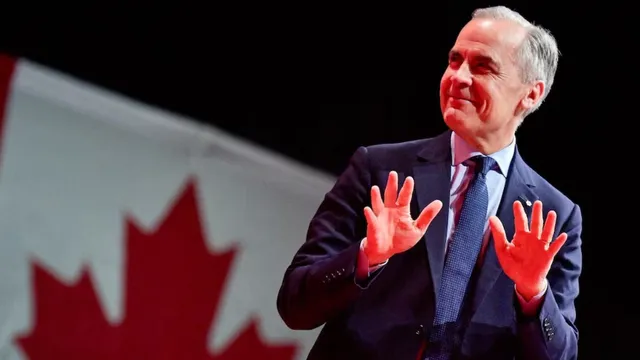- By Supratik Das
- Sat, 27 Sep 2025 10:25 PM (IST)
- Source:JND
Canada has signalled a major policy shift to attract foreign workers, particularly from India, after the United States unveiled a sweeping USD 100,000 supplemental fee on all new H-1B visa petitions.
Canadian Prime Minister Mark Carney, speaking in New York, directly addressed the development. “Not as many H-1B visa holders will get visas in the US. These people are skilled, and it is an opportunity for Canada. We will soon bring a proposal on this,” Carney said.
He added that Canada, which consistently loses top talent to its southern neighbour, is now positioned to retain and attract global professionals. “Our universities produce world-class graduates, but many leave for the US. Maybe this time we can hang on to one or two of them,” he remarked.
Trump Administration’s Shock Move
On September 19, President Donald Trump issued a proclamation requiring companies to pay a one-time USD 100,000 charge for every new H-1B application filed after 12:01 am ET on September 21, 2025. The measure, aimed at curbing alleged misuse of the H-1B programme, does not apply to renewals or existing visas but could severely restrict new entries.
• A USD 100,000 one-time fee has been introduced for all new H-1B visa petitions.
• The charge will not apply to renewals or to those already holding valid H-1B visas.
• The new rule takes effect in the upcoming visa lottery cycle.
• A new “Gold Card Residency Programme” worth USD 1 million was also unveiled for wealthy immigrants.
• US Citizenship and Immigration Services (USCIS) clarified that applications filed before September 21 will not be impacted.
Impact On Indian Students And Techies
India, which accounts for nearly three-quarters of H-1B visas annually, has been hit the hardest. For many young Indians, the fee hike represents a near collapse of their long-cherished plans.
• Over 70 per cent of all H-1B visas go to Indian nationals.
• The move could affect Indian tech professionals, remittances, and bilateral trade ties.
• Indian students currently form the largest foreign student group in the US, with 422,335 enrolled in 2024, an 11.8 per cent rise from the previous year.
• Several students say the new rule makes it financially unrealistic to seek sponsorship, especially from smaller firms.
• Families face uncertainty as students and professionals rethink plans.
• Indian IT majors like Tata Consultancy Services (TCS), which secured over 5,000 H-1B approvals in the first half of 2025 alone, fear disruption in business continuity.
• India’s IT association Nasscom warned that business continuity and project delivery in the US could be disrupted.
This is not the first time Canada has stepped in. In 2023, Ottawa launched a special work permit programme for US-based H-1B holders. The cap of 10,000 applications was filled within 48 hours, highlighting the demand among professionals for alternatives. Business groups, including Build Canada, are now urging the government to act swiftly. Proposals include a fast-tracked visa route for both current and potential H-1B holders, particularly those with high salaries or advanced technical skills.
ALSO READ: Trump’s H-1B Crackdown: Who Will Be Exempted From USD 1,00,000 Fee, Who Will Not? Check Details Here
While US agencies struggle to clarify the implementation process, uncertainty has already created anxiety among visa aspirants. Immigration lawyers are advising many workers to avoid overseas travel until the rules are fully settled.
For Canada, however, the shift represents a potential “brain gain”. With a similar work culture, overlapping time zones, and a clear pathway to permanent residency, Canada is emerging as the logical alternative for skilled Indians and other global professionals.

